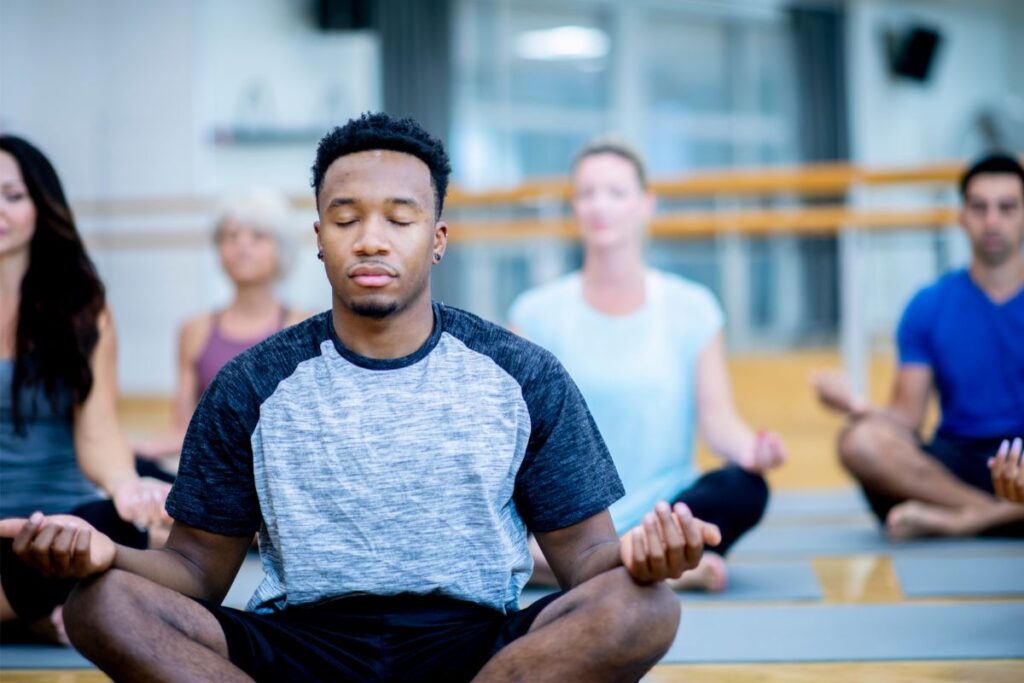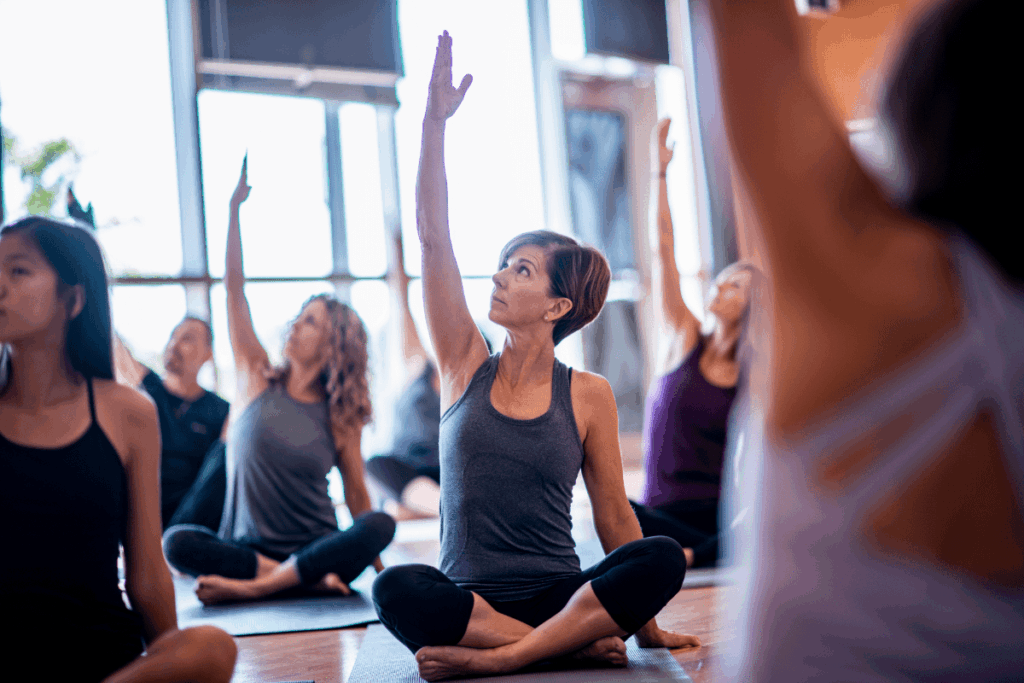For those struggling with depression, anxiety, PTSD, and other mental health disorders, yoga therapy offers a unique pathway to recovery, one that honors the connection between physical movement, breath, and emotional well-being.
At Robles Ranch, we’ve witnessed firsthand how this integrative approach can transform lives, offering hope and healing in an environment designed to nurture every aspect of your recovery.
Learn more about our luxury mental health treatment programs.
Call us now at 866-840-3841 or verify your insurance now.
What is Yoga Therapy?
Yoga therapy is a specialized practice that uses yoga postures, breathing techniques, meditation, and philosophical principles to address specific health concerns.
Unlike a general yoga class at your local studio, yoga therapy is individualized and therapeutic, designed by trained professionals who understand both yoga and healthcare.
A certified yoga therapist assesses each person’s unique needs and creates a customized practice that targets specific mental health symptoms. This might include gentle restorative poses for someone experiencing depression, grounding techniques for anxiety, or trauma-sensitive movements for those healing from PTSD.
The International Association of Yoga Therapists defines yoga therapy as “the process of empowering individuals to progress toward improved health and well-being through the application of the teachings and practices of yoga.”
It’s not about achieving perfect poses or flexibility—it’s about using yoga as medicine for the mind and body.

The Connection Between Yoga and Mental Health
The relationship between yoga and mental health runs deeper than simple relaxation. Yoga works on multiple levels simultaneously, addressing the complex interplay between our physical bodies, nervous systems, thoughts, and emotions.
When we experience mental health challenges, our bodies often hold that distress.
Anxiety lives in tight shoulders and shallow breath.
Depression manifests as low energy and disconnection from the body.
Trauma gets stored in our tissues, creating protective patterns that no longer serve us.
Yoga therapy recognizes these mind-body connections and provides tools to address them directly.
Through intentional movement, breathwork, and mindfulness, yoga helps regulate the nervous system—shifting us out of fight-or-flight responses and into states of rest and restoration.
It creates a safe space to reconnect with our bodies, often after periods of dissociation or disconnection. Perhaps most importantly, yoga teaches us that we have agency over our internal experience, empowering us to participate actively in our own healing.
The Psychological Benefits of Yoga
The psychological benefits of a consistent yoga practice are extensive and well-documented. Regular yoga practice has been shown to:
- Reduce stress and cortisol levels. Through conscious breathing and movement, yoga activates the parasympathetic nervous system, effectively lowering stress hormones and creating a physiological state of calm.
- Improve mood and emotional regulation. Yoga increases the production of GABA, a neurotransmitter that helps regulate mood, and promotes mindfulness skills that help us observe our emotions without being overwhelmed by them.
- Enhance self-awareness and body connection. Many mental health challenges involve disconnection from our physical selves. Yoga brings awareness back to bodily sensations, helping us recognize early warning signs of distress and respond with self-compassion.
Increase feelings of empowerment and self-efficacy. As practitioners develop strength, balance, and new capabilities on the mat, these feelings often translate into greater confidence in managing life’s challenges.
Improve sleep quality. Many people with mental health disorders struggle with sleep. Yoga’s relaxation techniques and physical movement can help regulate sleep cycles and improve rest.
Build community and reduce isolation. Group yoga classes create connection and belonging, countering the isolation that often accompanies mental health struggles.
Cultivate mindfulness and present-moment awareness. Yoga trains attention and presence, skills that are fundamental to mental health recovery and resilience.

Scientific Evidence Behind Yoga Therapy
Research shows that yoga can be as effective as medication for certain conditions, particularly mild to moderate depression and anxiety, with the added benefit of no negative side effects.
A meta-analysis published in the British Journal of Sports Medicine found that yoga significantly reduced symptoms of depression across multiple studies.
Neuroimaging studies reveal that regular yoga practice actually changes brain structure and function. It increases gray matter volume in areas associated with emotional regulation, decreases activity in the amygdala (the brain’s fear center), and strengthens connections between brain regions involved in attention and body awareness.
For trauma survivors, research has shown that trauma-sensitive yoga helps reduce PTSD symptoms by allowing individuals to safely reconnect with their bodies and develop new neural pathways that don’t trigger traumatic memories. A landmark study at the Justice Resource Institute found that trauma-sensitive yoga significantly reduced PTSD symptoms in women with chronic, treatment-resistant PTSD.
Studies on yoga’s impact on anxiety disorders demonstrate reduced symptoms across generalized anxiety disorder, social anxiety, and panic disorder. The breath-focused aspects of yoga appear particularly effective for managing the physical symptoms of anxiety, such as rapid heartbeat and shallow breathing.
How Can Yoga Help My Mental Health Disorder?
Yoga therapy can be adapted to support recovery from a wide range of mental health conditions. While it’s not a replacement for professional mental health treatment, it serves as a powerful complementary therapy that addresses symptoms from multiple angles. Here’s how yoga therapy can specifically support various mental health disorders:
Depression
For those experiencing depression, yoga offers a gentle yet effective intervention that addresses both the physical lethargy and the negative thought patterns characteristic of the condition. The combination of movement and breathwork helps increase energy levels and combat the fatigue that makes depression so debilitating.
Yoga stimulates the production of serotonin and dopamine, neurotransmitters that are often depleted in depression. Certain poses, particularly gentle backbends and heart-opening postures, can help counter the collapsed, inward posture that often accompanies low mood. The mindfulness component helps individuals recognize negative thought patterns and develop healthier relationships with their thoughts rather than being consumed by them.
Anxiety Disorders
Anxiety lives in the body as much as in the mind, and yoga directly addresses both aspects. For people with generalized anxiety disorder, panic disorder, or social anxiety, yoga provides practical tools for managing the physical symptoms of anxiety—racing heart, shallow breathing, muscle tension, and restlessness.
Pranayama, or breath control techniques, are particularly powerful for anxiety. Extended exhales, alternate nostril breathing, and breath awareness practices activate the vagus nerve and parasympathetic nervous system, creating an immediate calming effect. These are portable tools that can be used anywhere anxiety strikes.
Complex PTSD
Complex PTSD, which results from prolonged or repeated trauma, often involves difficulties with emotional regulation, self-concept, and interpersonal relationships that go beyond the symptoms of standard PTSD. Yoga therapy for complex PTSD focuses on helping individuals reclaim a sense of safety in their bodies and develop new ways of relating to themselves.
The practice emphasizes choice, agency, and empowerment—inviting rather than instructing, offering options rather than demanding compliance. This is crucial for trauma survivors who may have experienced violations of their autonomy. Yoga helps re-establish the sense that “my body is mine” and “I can make choices about my experience.”
PTSD
Post-traumatic stress disorder involves intrusive memories, hypervigilance, avoidance, and significant changes in mood and thinking following traumatic events. Trauma-sensitive yoga has emerged as an evidence-based complementary treatment for PTSD, with research showing significant symptom reduction.
Yoga helps individuals with PTSD by addressing the nervous system dysregulation that underlies many symptoms. Trauma leaves the nervous system stuck in states of high alert or shutdown. Through specific practices, yoga helps restore balance and flexibility to the nervous system’s responses.
Bipolar Disorder
For individuals with bipolar disorder, yoga offers tools for mood stabilization and early recognition of mood shifts. The regular practice creates routine and structure, which are important for managing bipolar disorder, while the self-awareness cultivated through yoga helps individuals notice early warning signs of manic or depressive episodes.
During depressive phases, energizing practices with standing poses and gentle backbends can help lift mood and energy. During hypomanic or manic phases, cooling, grounding practices with forward folds and restorative poses can help bring calm and balance. The key is adapting the practice to support stability rather than pushing toward extremes.
Schizophrenia
While yoga therapy for schizophrenia requires careful adaptation and should always be integrated with psychiatric treatment, research suggests it can be a beneficial complementary therapy. Yoga may help reduce some negative symptoms of schizophrenia, such as social withdrawal and diminished emotional expression, while also addressing anxiety and depression that often co-occur with the condition.

Components of Yoga Therapy for Mental Health
Effective yoga therapy for mental health incorporates multiple elements, each contributing to the healing process in unique ways:
- Asana (Physical Postures): Intentional movements and poses that release tension, build strength, and create new relationships with the body. For mental health, the focus is less on achievement and more on awareness, breath integration, and self-compassion.
- Pranayama (Breath Work): Controlled breathing techniques that directly influence the nervous system, helping to manage anxiety, improve focus, and regulate emotional states. Different breathing patterns create different effects, from energizing to calming.
- Meditation and Mindfulness: Practices that cultivate present-moment awareness and help individuals observe their thoughts and emotions without judgment. This develops the psychological flexibility needed for mental health recovery.
- Yoga Nidra (Yogic Sleep): A guided relaxation practice that induces deep rest while maintaining awareness. Particularly helpful for insomnia, anxiety, and PTSD, yoga nidra allows the nervous system to reset and restore.
- Body Awareness Practices: Techniques that help individuals reconnect with physical sensations safely and gradually, essential for trauma recovery and managing dissociation.
- Philosophical Teachings: The ethical guidelines and wisdom of yoga philosophy, adapted for therapeutic use, provide frameworks for self-reflection, personal growth, and developing a more compassionate relationship with oneself.
- Mantra and Sound: The use of sound and vibration to focus the mind, shift emotional states, and create a sense of connection and peace.
How Robles Ranch Integrates Yoga Therapy into Residential Treatment
At Robles Ranch, yoga therapy isn’t an afterthought or a generic wellness activity—it’s a core component of our comprehensive residential treatment approach. We understand that healing from mental health challenges requires addressing the whole person, and yoga provides a unique bridge between mind, body, and spirit.
At Robles Ranch, yoga doesn’t exist in isolation. Our yoga teachers collaborate closely with your psychiatrist, therapist, and the entire clinical team to ensure that your yoga practice supports your overall treatment plan. We share insights about your progress and adjust practices as your needs evolve.
Yoga Resources
As you explore yoga therapy for mental health, these resources can provide additional information and support:
- International Association of Yoga Therapists (IAYT) – The professional organization for yoga therapists with research, directories, and educational resources
- Trauma Center Trauma-Sensitive Yoga (TCTSY) – Pioneers in trauma-informed yoga with training and resources
- Yoga Alliance – Registry of certified yoga teachers and therapists
Begin Your Healing Journey at Robles Ranch
Mental health recovery isn’t about finding a single solution—it’s about discovering the unique combination of approaches that works for you. For many people, yoga therapy becomes a cornerstone of healing, offering practical tools for managing symptoms, a pathway to reconnection with self, and a practice that continues to serve them long after formal treatment ends.
At Robles Ranch, we’ve created a facility where ancient wisdom meets modern mental health treatment. Here, among the oak trees and rolling hills of California’s Central Coast, you’ll find expert clinical care, compassionate support, and innovative therapies like yoga that honor the profound connection between mind, body, and spirit.
If you or a loved one is struggling with depression, anxiety, PTSD, bipolar disorder, or other mental health challenges, we invite you to learn more about how our integrative approach can support your recovery. Yoga therapy isn’t magic, but for many, it’s been transformative—a key that unlocked doors they didn’t know existed.
Call us now at 866-840-3841 or verify your insurance now.
Get Help Now
If you or a loved one is struggling with mental health issues or dual diagnosis disorders and seeking a balanced approach to recovery, our luxury mental health programs in California may be the right choice.
Latest Posts

Complex Trauma Residential Treatment

Silent Panic Attack





